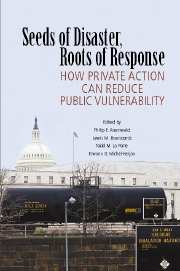Book contents
- Frontmatter
- Contents
- List of Contributors
- Foreword, by General Robert T. Marsh
- Preface
- Acknowledgments
- I SEEDS OF DISASTER
- II A CRITICAL CHALLENGE
- III MANAGING ORGANIZATIONS
- 6 Managing for the Unexpected: Reliability and Organizational Resilience
- 7 Notes Toward a Theory of the Management of Vulnerability
- 8 Challenges of Assuring High Reliability When Facing Suicidal Terrorism
- 9 Managing for Reliability in an Age of Terrorism
- 10 Organizational Strategies for Complex System Resilience, Reliability, and Adaptation
- IV SECURING NETWORKS
- V CREATING MARKETS
- VI BUILDING TRUST
- VII ROOTS OF RESPONSE
- References
- Contributors
- Author Index
- Subject Index
8 - Challenges of Assuring High Reliability When Facing Suicidal Terrorism
Published online by Cambridge University Press: 30 July 2009
- Frontmatter
- Contents
- List of Contributors
- Foreword, by General Robert T. Marsh
- Preface
- Acknowledgments
- I SEEDS OF DISASTER
- II A CRITICAL CHALLENGE
- III MANAGING ORGANIZATIONS
- 6 Managing for the Unexpected: Reliability and Organizational Resilience
- 7 Notes Toward a Theory of the Management of Vulnerability
- 8 Challenges of Assuring High Reliability When Facing Suicidal Terrorism
- 9 Managing for Reliability in an Age of Terrorism
- 10 Organizational Strategies for Complex System Resilience, Reliability, and Adaptation
- IV SECURING NETWORKS
- V CREATING MARKETS
- VI BUILDING TRUST
- VII ROOTS OF RESPONSE
- References
- Contributors
- Author Index
- Subject Index
Summary
America's critical infrastructure, if it is to adapt to today's threat environment, needs to demonstrate qualities of high reliability and extended continuity. Critical infrastructure must be prepared for the uncertain conditions arising from a newly recognized source of aggression – the prospects of sustained social predation, sometimes delivered with a very destructive sacrificial twist. What some mislabel as “suicide terrorism,” others more properly term “martyr operations.”
How might these unexpected developments be viewed through the lenses of organization/institutional perspectives and the challenges of operating America's critical infrastructure? At least five characteristics of current U.S. infrastructure are relevant: (1) The infrastructure is widely dispersed geographically. (2) It is tightly coupled physically with interdependent organizational elements. (3) It is, in part, highly hazardous to operators, users, neighbors, and citizens. (4) The infrastructure is increasingly spare, with reduced component redundancy and organizational robustness and fewer alternatives if failures occur (telecommunications are the exception). (5) Finally, the infrastructure is critical to citizen well-being. Even limited incapacity of systems is perceived to have unacceptable consequences.
We also live in a time of reasonably high economic uncertainty, amid abiding skepticism of large institutions – sometimes crystallizing as overt public distrust. These conditions have shaped the evolution of U.S. infrastructure communities, an evolution that has resulted in the provision of services we experience today. The evolution is marked by increased opportunities to operate with less regulation and constraint, in an economic environment that propels senior management to search for efficiency-enhancing tactics.
- Type
- Chapter
- Information
- Seeds of Disaster, Roots of ResponseHow Private Action Can Reduce Public Vulnerability, pp. 99 - 120Publisher: Cambridge University PressPrint publication year: 2006
- 2
- Cited by



